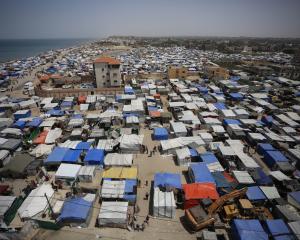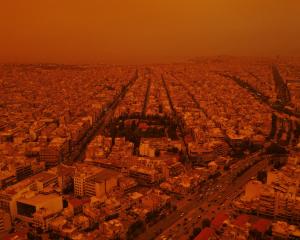A convoy of evacuees from the Canadian oil hub of Fort McMurray has made its way through the heart of an out-of-control wildfire on the only highway out of the region, passing through the burned ruins of the city.
High winds and parched timber and brush from a spring heat wave stoked flames, which have engulfed 101,000ha in Canada's energy heartland since erupting on April 30. Some 88,000 people were forced to flee Fort McMurray and two oil sands sites south of the city were threatened.
Earlier in the week most evacuees headed south by car on Alberta Highway 63, the only land route out of the area, in a slow-moving exodus that left many temporarily stranded on the roadside as they ran out of gasoline.
But other residents who initially fled to oil camps and settlements north of the city found themselves cut off in overcrowded conditions. They were forced on Friday to retrace their route back through Fort McMurray on Highway 63 as flames continued to spread.
Evacuees in some 1500 vehicles began making 50km trip at 4am on Friday (local time) in groups of 50 cars.
"It reminded us of a war zone," said Marisa Heath, who spent 36 hours in her truck on the side of the highway with her husband, two dogs, a cat and seven kittens. "Eerie. All you could see was cement foundations of houses."
Helicopters hovered overhead watching for flames, and police set up emergency fuel stations along the highway to keep the line of cars moving. They headed toward safety south of Fort McMurray in towns including Lac La Biche, 290km away, and the provincial capital Edmonton about 430km away.
The convoy was halted briefly around midday due to heavy smoke, but officials said the majority of vehicles had already passed through town by then.
OIL PRODUCTION CUT
About a third of Canada's oil production has been shut down by the conflagration, according to a Reuters estimate.
South of Fort McMurray, CNOOC Nexen's Long Lake oil sands facility and Athabasca Oil's Hangingstone project were in danger, emergency officials reported. Both facilities have been evacuated.
BP Plc's Canadian unit has declared a force majeure resulting in the reduction of available Western Canadian Select crude, among other Canadian grades, according to two trading sources familiar with the matter.
There have been no known casualties from the fire itself, but fatalities were reported earlier this week in at least one car crash among the evacuees. Some 1600 structures have been destroyed in Fort McMurray, authorities said.
EXTENSIVE DAMAGE
Winds were expected on Friday to push the leading edge of the main fire to northeast, and away from town, but parts of the city were still in flames.
Authorities planned to airlift about 8000 of the 25,000 evacuees who were initially chased north of the city.
Cecil Dickason, a Fort McMurray resident who was part of the convoy, said the battered city looked "awful." Others described the city as dark and smoke-filled, pockmarked with charred and abandoned vehicles and roadside spot fires.
Entire neighborhoods were reduced to ruins, but most evacuees fled without knowing the fate of their own homes. The majority got away with few possessions, some forced to leave pets behind.
Bill Glynn, who took part in the convoy, told the Edmonton Journal newspaper that he travelled through smoke so thick he lost sight of the car in front of him as they crept through the city.
"It was scary," evacuee Sarah Babstock told the newspaper. "We came through with clothes over our mouths so we could breathe."
In a press briefing on Friday, Alberta Premier Rachel Notley said damage to Fort McMurray was extensive.
"The city of Fort McMurray is not safe to return to, and this will be true for a significant period of time," she said, adding that officers of the Royal Canadian Mounted Police would secure and protect what was left of the town.
The Alberta government has approved emergency funding for wildfire evacuees, and will be giving out $C1250 ($NZ1415) per adult and $500 per dependent.












